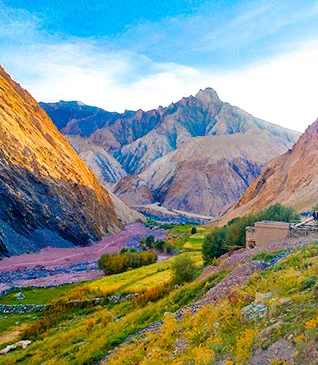Trekking in the Himalayas is more than just an adventure. You not only experience adventure and thrill but also get to learn a lot of things. Being in the wilderness pushes people out of their comfort zone and as such they can learn how resilient they are. The Trek Leader, guiding us on the trail is like the beacon of light that shows the path and there’s so much we can learn from them. They have mastered a lot of the outdoor world and there’s a lot of insight that one can gain in their company. These trailblazers can also be our mentors of Experiential Learning and we can gain an abundance of knowledge and virtues from them. This will help us not just in the trails but in the world in general. So let us first start by understanding the concept of Experiential Learning.
What is Experiential Learning?
Experiential learning is a dynamic educational approach that emphasizes the direct engagement of individuals in hands-on experiences. It centres on the idea that individuals acquire knowledge and develop skills best through direct encounters with real-world situations. Unlike traditional classroom learning, experiential learning encourages active participation, reflection, and application of knowledge in practical settings. It's a holistic process that involves doing, feeling, thinking, and reflecting.
Importance of Experiential Learning for Personal Growth
.webp)
→ Experiential learning provides a bridge between theoretical knowledge and practical application. It allows individuals to apply what they've learned in real-life scenarios, fostering a deeper understanding of concepts.
→ Engaging in hands-on experiences enhances memory retention. The emotional and sensory elements involved in experiential learning make the acquired knowledge more memorable and applicable.
→ By facing challenges and problem-solving in real-time, individuals develop critical thinking skills.
→ Experiential learning often involves reflection on experiences, leading to increased self-awareness. Individuals gain insights into their strengths, weaknesses, and areas for improvement.
→ Whether it's navigating a trail or overcoming obstacles during a trek, individuals learn to trust their abilities and push beyond perceived limitations.
→ Interacting with others during experiential learning activities hones communication skills.
Trek Leaders as Experiential Learning Guides

Trek leaders play a pivotal role in facilitating experiential learning in outdoor settings. In a trekking group, leaders foster a sense of community and collaboration. Participants learn the importance of teamwork, effective communication, and mutual support under the guidance of trek leaders. They can create an environment where individuals can take calculated risks, pushing their boundaries while ensuring a safe and secure learning experience. By encouraging self-reflection and providing guidance, trek leaders become catalysts for personal development. They inspire participants to embrace challenges, fostering resilience and adaptability.
The Role of Trek Leaders in Experiential Learning

1. Lessons in Leadership
→ Under the guidance of Trek Leaders, participants learn to assess situations, consider available resources, and make informed decisions. Whether it's choosing the best route or deciding when to set up camp, decision-making in the wilderness requires a blend of knowledge, intuition, and adaptability.
→ Leaders teach participants to evaluate risks and make decisions that prioritize safety. Navigating through unpredictable terrain involves constant risk assessment, and trek leaders guide participants in making decisions that balance adventure with caution.
→ Every decision in the wilderness has consequences. Leaders facilitate reflection on the outcomes of choices, reinforcing the importance of accountability and the ability to learn from both successes and mistakes.
2. Effective Communication Building
→ Trek leaders emphasize the importance of expressing thoughts and instructions concisely, ensuring that everyone in the group understands and follows directions.
→ Leaders encourage active listening within the group. Participants learn to absorb information from their surroundings, fellow trekkers, and the leader. Effective communication in the wilderness is a two-way street, and trek leaders emphasize the importance of listening to both verbal and non-verbal cues.
→ Different situations call for varied communication styles. Trek leaders teach participants to adapt their communication to the needs of the group, whether it's providing motivation during a challenging ascent or giving clear instructions during a tricky descent.
3. Team Building & Collaboration
→ Trek leaders instil a sense of shared purpose among participants. Individuals earn the importance of working together toward a common objective.
→ Leaders facilitate activities that help participants recognize each other's strengths and weaknesses. Understanding the unique contributions of each team member develops a supportive and collaborative environment.
→ Challenges on the trail may lead to conflicts, and trek leaders guide participants in resolving disputes amicably. The wilderness becomes a training ground for conflict resolution, emphasizing the need for diplomacy and compromise.
→ Trust is a cornerstone of effective teamwork. Trek leaders create situations that require participants to rely on each other, creating trust and brotherhood within the group.
4. Outdoor Survival Skills
→ Leaders teach the importance of choosing suitable campsites, considering factors such as terrain, weather, and proximity to water sources. Participants learn to assess the safety and practicality of a location for setting up camp.
→ Trek leaders demonstrate and guide participants in building different types of shelters using natural resources. By helping in setting up tents, participants acquire hands-on experience in creating safe and comfortable shelters in the wilderness.
→ Trek leaders teach participants how to assess and prioritize injuries or illnesses in a wilderness setting. Understanding the severity of conditions and taking prompt action can be crucial in emergency situations
→ Leaders educate participants on the essential items to include in a wilderness first aid kit. From bandages and antiseptics to more specialized items, trek leaders ensure that participants are well-prepared to address common injuries and ailments.
5. Environmental Awareness & Sustainability
→ Trek leaders educate participants about the Leave No Trace principles. These principles emphasize minimizing environmental impact and preserving the natural beauty of outdoor spaces.
→ Leaders demonstrate and encourage participants to put Leave No Trace principles into practice during the trek. This includes proper waste disposal, and staying on designated trails. Participants learn to leave the environment as they found it, minimizing their footprint.
→ Leaders reinforce the importance of carrying out all waste, including trash and leftover food. Through hands-on experience, participants understand the significance of packing out everything they bring into the wilderness, ensuring no trace of their presence remains.
→ Leaders discuss the potential impact of human activities on local ecosystems. Participants learn how even seemingly small actions, such as trampling on vegetation or disturbing wildlife, can have long-lasting consequences. This awareness encourages responsible behavior in natural settings.
6. Overcoming Challenges
→ Trek leaders structure the trek to include a variety of physical challenges, gradually increasing in intensity. This approach helps participants build resilience by pushing their physical limits incrementally, fostering a sense of accomplishment with each milestone.
→ Leaders encourage participants to adapt to the changing physical demands of the trek. Whether it's steep ascents, river crossings, or challenging weather conditions, the experience teaches individuals to embrace discomfort and persist through adversity.
→ Trekking environments are inherently unpredictable, and leaders guide participants in developing mental toughness by adapting to unexpected situations. Whether it's a sudden change in weather or a route alteration, participants learn to approach challenges with flexibility and composure.
→ Trek leaders emphasize the power of positive self-talk as a tool for mental resilience. Encouraging participants to reframe challenges as opportunities for growth, leaders help them develop a constructive mindset that bolsters mental strength.
→ Trek leaders instil the idea that challenges are not roadblocks but growth opportunities. By framing difficulties as chances to learn and improve, participants develop a growth mindset that sees setbacks as a natural part of the learning process.
→ Leaders ensure that participants celebrate both small and significant achievements throughout the trek. This positive reinforcement reinforces the concept that effort leads to success, contributing to the development of a growth mindset.
7. Cultural & Social Insights
→ Trek leaders educate participants about the customs and traditions of the areas they traverse. This includes guidelines on appropriate behaviour, attire, and gestures, fostering cultural respect and minimizing unintentional cultural insensitivity.
→ Often trek groups consist of people from different backgrounds and perspectives. participants learn to navigate and appreciate diversity, developing teamwork and unity in the face of challenges.
→ Trek leaders educate aparticipants on responsible tourism practices, emphasizing the importance of leaving a positive impact on the communities they encounter. This includes supporting local businesses, respecting cultural heritage sites, and minimizing environmental impact.
Trekking is a wonderful way of embracing the concept of Experiential Learning. It's a chance to discover resilience, build leadership skills, and cultivate a mindset of continuous learning. The serene landscapes, challenging terrains, and diverse ecosystems provide a backdrop for immersive learning experiences that connect individuals with the natural world. Trek leaders serve as the compass and mentors on this experiential learning journey, guiding individuals through challenges and facilitating transformative experiences. The journey to learning awaits, and our skilled trek leaders will be by your side.
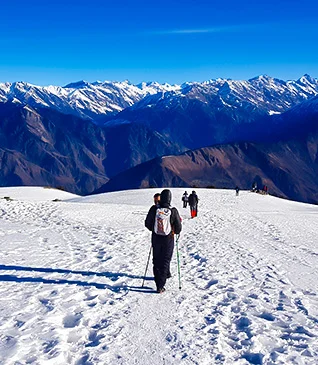
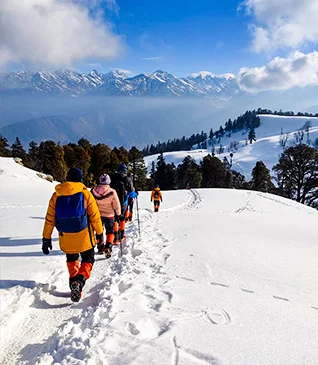



.webp)





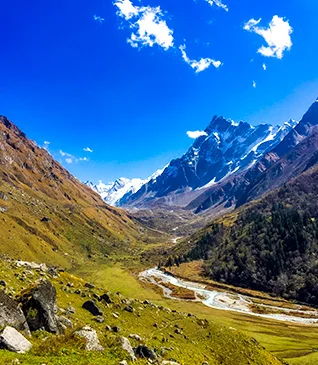
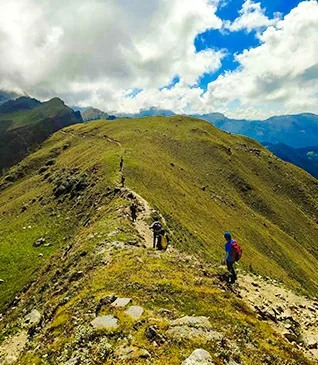
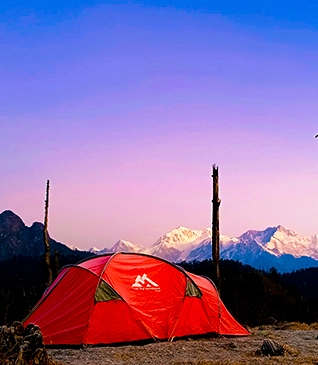
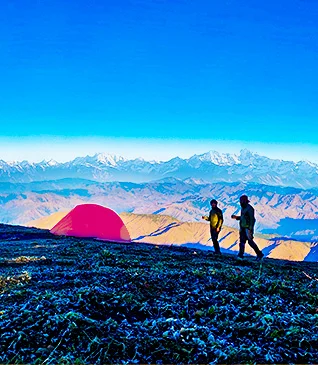
.webp)
.webp)
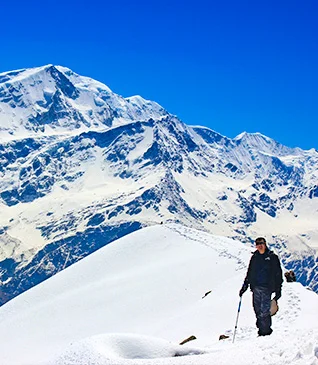

.webp)
.webp)
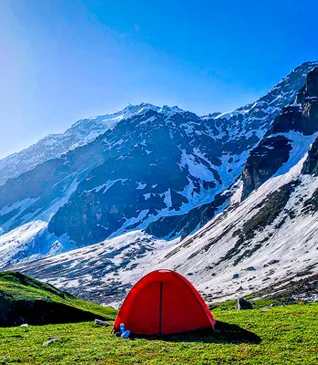
.webp)
